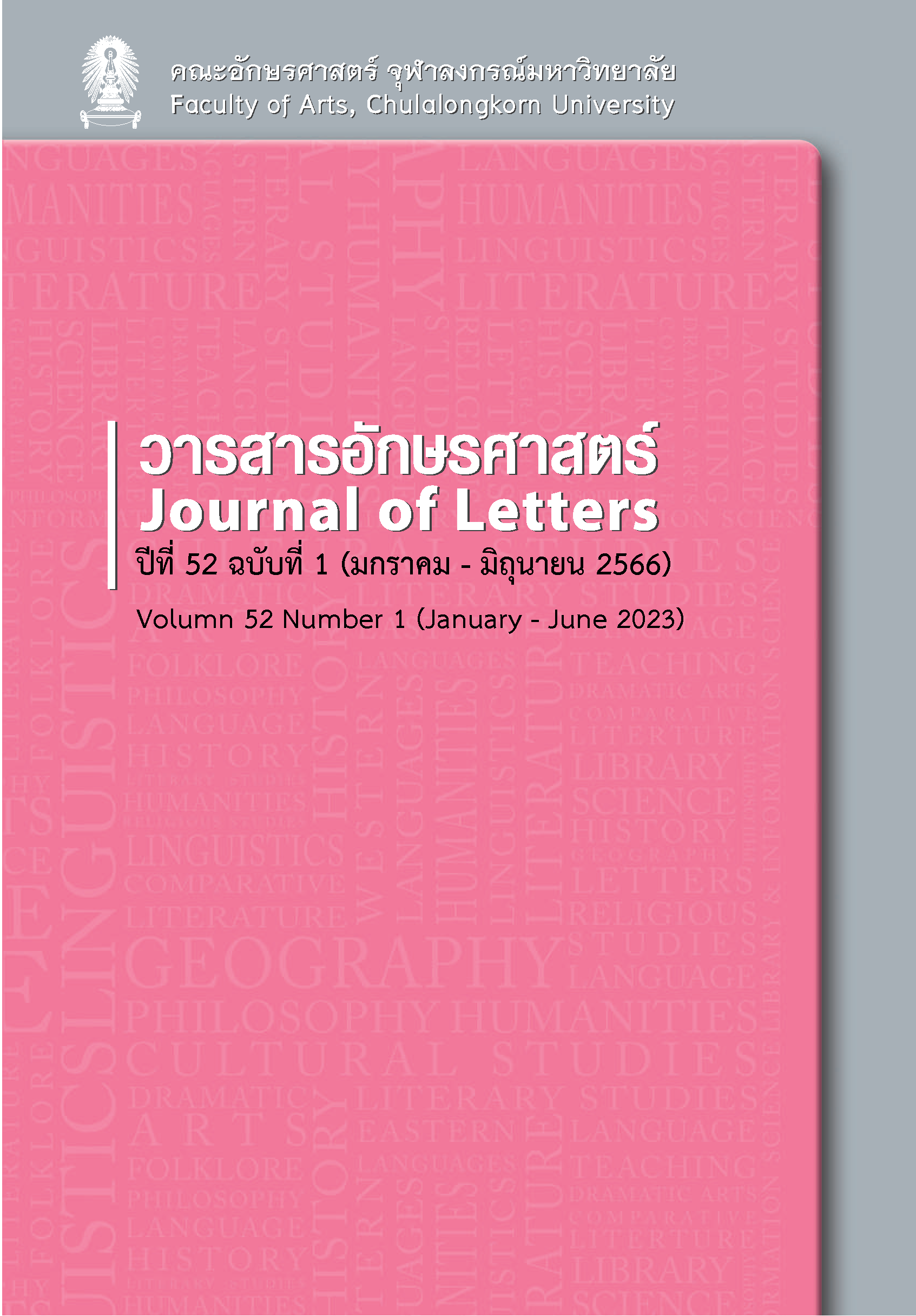Queer Affective Posthumanism:
A case study of Wanda in WandaVision Series
Keywords:
Posthuman, queer, affect, negative affect, WandaVisionAbstract
This article aims to study and explore the concept of posthumanism in connection with the approach of affect theory to delineate the creative trajectory and practice in deploying these approaches. By doing so, Wanda, the main character of “WandaVision”, is employed as the core analysis to illustrate the element of posthuman and affect concepts in practice. In the lens of posthumanism, Wanda is perceived as a witch, positioned in the in-between space of humans and non-humans. This in-between space can be seen as a hybrid space that is culturally and socially queer. The applications of affective posthumanism and queer studies via Wanda’s trauma and desire depict the affective drives used by inanimate subjects to achieve the fantasy of the “good life and good family” influenced by American dream and normativity. Significantly, the affective drives, explicitly and implicitly dominated Wanda, are negative affects that drive her to make her fantasy world-making. The negative affects in this context function to forge the sense of hope and redefines the concept of the family as a space of queer utopia. Simultaneously, by creating a sense of hope and reorienting how a family could be, it also makes a critique of normative ideology by revealing the ideal and fantasy in normative life.
References
ภาษาไทย
Chutima Prakatwutthisan ชุติมา ประกาศวุฒิสาร. (2010). Nakorn Khasem kap phawa sungwai nai mumming Queer นาครเขษม กับภาวะสูงวัยในมุมมองเควียร์ [Nakorn Khasem and aging conditions in Queer perspectives]. In Natthanai Prasannam (Ed.), Dae saksri samoe kan tuk chan chon: Wannakam kap sitthi manutsayachon sueksa แด่ศักดิ์ศรีเสมอกันทุกชั้นชน: วรรณกรรมกับสิทธิมนุษยชนศึกษา [An honor to all classes: Literature and human rights] (pp. 22-44). Department of Literature, Faculty of Humanities, Kasetsart University; The National Human Rights Commission of Thailand; Bangkok Art and Culture Centre.
ภาษาต่างประเทศ
Ahmed, S. (2010). The promise of happiness. Duke University Press.
Berlant, L. (1997). The queen of America goes to Washington City: Essays on sex and citizenship. Duke University Press.
Berlant, L. (2011). Cruel optimism. Duke University Press.
Braidotti, R. (2013). The Posthuman. Polity.
Braidotti, R. (2019). Posthuman knowledge. Polity.
Butler, J. (1997). The psychic life of power: Theories in subjection. Stanford University Press.
Chen, M. Y. (2012). Animacies: Biopolitics, racial mattering, queer affect. Duke University Press.
Chen, M. Y. (2017) Toxic animacies, inanimate affections. In C. Cipolla, K. Gupta, D. A. Rubin & A. Willey (Eds.), Queer feminist science studies: A reader (pp. 296-309). University of Washington Press.
de Spinoza, B. (1958). The political works. (A. G. Wernham, Trans. & Ed.). Clar-endon Press.
Deleuze, G., & Guattari, F. (1987). A thousand plateaus: Capitalism and schizophrenia. (B. Massumi, Trans.) University of Minneapolis Press.
Edelman, L. (2004). No future: Queer theory and death drive. Duke University Press.
Eng, D., & Kazanjian, D. (2003). Introduction mourning remain. In D. Eng & D. Kazanjian (Eds.), Loss: The politics of mourning (pp. 1-25). University of California Press.
Gregg, M., & Seigworth, G. J. (2012). An inventory of shimmers. In M. Gregg & G. J. Seigworth (Eds.), The Affect theory reader (pp. 1-25). Duke University Press.
Haraway, D. (2003). The companion species manifesto: Dogs, people and significant otherness. Prickly Paradigm Press.
Haraway, D. (2004). Cyborgs to companion species: Reconfiguring kinship in technoscience. In The Haraway readers (pp. 295-320). Routledge.
Hutton, R. (2017). The witch: A history of fear, from ancient times to the present. Yale University Press.
Massumi, B. (1995). The autonomy of Affect. Cultural Critique, 31, 83-109. https://doi.org/10.2307/1354446
Muñoz, J. E. (2009). Cruising utopia: The then and there of queer futurity. NYU Press.
Pellegrini, A., & Puar, J. (2009). Affect. Social Text, 27(3 (100)), 35-38. https://doi.org/10.1215/01642472-2009-004
Povinelli, E. A. (2011). Between Gaia and ground: Four axioms of existence and the ancestral catastrophe of late liberalism. Duke University Press.
Sedgwick, E. K. (2003). Touching feeling: Affect, pedagogy, performativity. Duke University Press.
Sharkman, M. (2021). WandaVision. Disney Plus. Retrieved August 14, 2022, from https://www.disneyplus.com/home
Vermulen, P. (2014). Posthuman affect. European Journal of English Studies, 18(2), 121-134. https://doi.org/10.1080/13825577.2014.917001
Downloads
Published
How to Cite
Issue
Section
License

This work is licensed under a Creative Commons Attribution-NonCommercial-NoDerivatives 4.0 International License.
Copyright and plagiarism
Authors are responsible for obtaining permission to use copyrighted materials from copyright owners. Authors are responsible for observing requisite copyright law when quoting or reproducing copyrighted materials. Quotations and reproductions of content from other published sources must be accompanied by a reference and all sources should be clearly listed in the references section. Quotations and reproductions of content from external sources without due attribution could be considered a severe infringement of academic conduct and may constitute a legal offence under the Copyright Act of B.E. 2537. Any legal ramifications arising from the infringement of copyright regulations would be the sole responsibility of the author(s).



